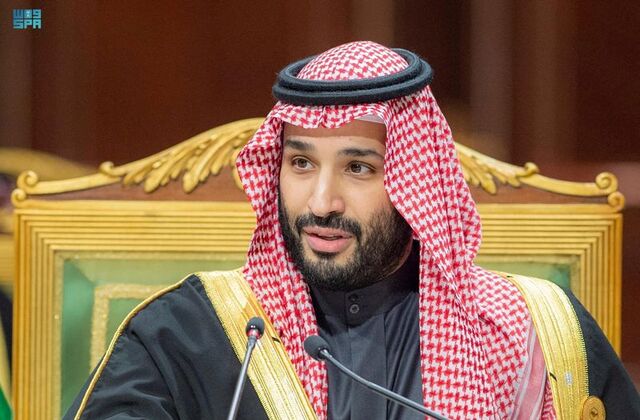
STRATEGIC ASSESSMENT-Mohammad bin Salman (MBS) significant additional leverage in his troubled relationship with the United States. The Russian invasion—and the U.S. and European imposition of sanctions on some of Russia’s energy exports in response—has caused a sharp rise in energy prices. As the world’s third largest oil producer (behind the United States and Russia) and the major actor within the Organization of Petroleum Exporting Countries (OPEC) cartel, Saudi leverage over the United States has increased significantly.
With his father, King Salman, ailing, MBS is not only the Kingdom’s heir apparent but also its de-facto leader. If they are to obtain a Saudi commitment to increase oil production and bring world oil prices back to pre-invasion levels, senior U.S. officials would need to approach MBS directly.
Recognizing the U.S. interest in engaging him, MBS seeks to alter his relationship with the U.S. government to his advantage—a relationship still clouded by his involvement in the October 2018 killing of Saudi dissident journalist Jamal Khashoggi at the Saudi consulate in Istanbul. A U.S. intelligence report released one month after President Joseph Biden took office directly linked MBS to that killing.
In large part because of the Khashoggi killing, President Biden has pointedly insisted on interacting only with the 86-year-old King Salman, most recently in a February 9 phone call that affirmed the two countries’ strategic and economic partnership. In the context of the Ukraine crisis, MBS perceives that U.S. efforts to encourage more oil production will yield him concessions from Washington, including legal immunity from lawsuits for that killing and deference to his stature as the Kingdom’s next leader. MBS also sees an opportunity to influence U.S. diplomacy to revive the 2015 Iran nuclear deal, which the Kingdom assesses will not roll back Iran’s regional influence, as well as to mute U.S criticism of the Saudi and UAE war tactics in Yemen.
MBS enlisted U.S. support for a February 28 UN Security Council resolution imposing a worldwide arms embargo on the Iran-backed Houthi movement, although he reportedly still resents the 2021 revocation of the Trump administration’s designation of the Houthis as a Foreign Terrorist Organization (FTO). MBS reportedly also wants U.S. help with the Saudi civilian nuclear program.
On oil issues, which are his key source of leverage with Washington on all the various bilateral files, MBS has thus far withheld any major concessions. It was reported in early March that the White House was not successful in arranging calls between President Biden, MBS, and de-facto UAE leader Mohammad bin Zayid Al Nahyan (MBZ)—calls intended to build international support for Ukraine and limit the spike in oil prices.
The UAE ministry of foreign affairs said that the call to MBZ would be rescheduled, but Saudi officials made no such pledge of an eventual U.S. presidential conversation with MBS. Saudi Arabia and the UAE, together, have most of the estimated 2 million barrels per day of global spare production capacity and could put more oil on the global market immediately, if their leaders chose to do so.
But, most recently in a reported conversation with U.K. Prime Minister Boris Johnson on global energy security on March 16, the two Gulf leaders refused to announce production increases. Both Gulf states also continue to consult with Russia on oil issues, despite the worldwide condemnation of Russia for the invasion of Ukraine.
In addition to declining U.S. requests to ease the global oil supply crunch, MBS has not shied away from indirect threats in his relationship with U.S. officials. In recently published interviews, including with The Atlantic, MBS has warned that U.S. attempts to isolate him would prove counterproductive to U.S. policy. Even after the publication of the interview in which MBS attempted to portray moderation, Saudi Arabia executed 81 individuals, accused of a range of alleged crimes.
In early March, the official Saudi Press Agency quoted MBS as threatening to reduce the $800 billion worth of Saudi investments in the United States by stating: “In the same way we have the possibility of boosting our interests, we have the possibility of reducing them.” Perhaps more troublesome for U.S. officials, MBS has also signaled that he wants to expand relations with U.S. rival global power China. He was quoted in The Atlantic as saying: “Where is the potential in the world today? It’s in Saudi Arabia.
And if you want to miss it, I believe other people in the East are going to be super happy.” Saudi Arabia has invited China’s President Xi Jinping to visit Riyadh, reportedly after the Islamic holy month of Ramadan that begins in early April. A Saudi official explained the planned Xi visit by saying: “The crown prince and Xi are close friends and both understand that there is huge potential for stronger ties…It is not just ‘They buy oil from us, and we buy weapons from them.
‘” Yet, notwithstanding his potential tilt toward China, MBS’ leverage against the United States might be less than he calculates. Russian forces have performed poorly on the Ukraine battlefield, and Russian President Vladimir Putin is isolated financially and diplomatically, possibly demonstrating that there are no readily available alternatives to the United States as the ultimate guarantor of Gulf security.





